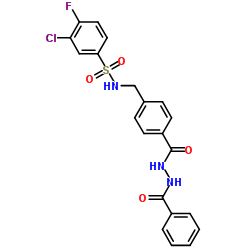TCN 201

TCN 201 structure
|
Common Name | TCN 201 | ||
|---|---|---|---|---|
| CAS Number | 852918-02-6 | Molecular Weight | 461.894 | |
| Density | 1.4±0.1 g/cm3 | Boiling Point | N/A | |
| Molecular Formula | C21H17ClFN3O4S | Melting Point | N/A | |
| MSDS | USA | Flash Point | N/A | |
| Symbol |

GHS07 |
Signal Word | Warning | |
|
Sensitivity of N-methyl-D-aspartate receptor-mediated excitatory postsynaptic potentials and synaptic plasticity to TCN 201 and TCN 213 in rat hippocampal slices.
J. Pharmacol. Exp. Ther. 352(2) , 267-73, (2014) Whereas ifenprodil has been used as a selective GluN1/GluN2B (NR1/NR2B, B-type) receptor antagonist to distinguish between GluN2B (NR2B) and GluN2A (NR2A)-containing N-methyl-d-aspartate receptors (NMDARs), TCN 201 (3-chloro-4-fluoro-N-[4-[[2-(phenylcarbonyl)... |
|
|
PAR1-activated astrocytes in the nucleus of the solitary tract stimulate adjacent neurons via NMDA receptors.
J. Neurosci. 35(2) , 776-85, (2015) Severe autonomic dysfunction, including the loss of control of the cardiovascular, respiratory, and gastrointestinal systems, is a common comorbidity of stroke and other bleeding head injuries. Previous studies suggest that this collapse of autonomic control ... |
|
|
Extrasynaptic glutamate release through cystine/glutamate antiporter contributes to ischemic damage.
J. Clin. Invest. 124(8) , 3645-55, (2014) During brain ischemia, an excessive release of glutamate triggers neuronal death through the overactivation of NMDA receptors (NMDARs); however, the underlying pathways that alter glutamate homeostasis and whether synaptic or extrasynaptic sites are responsib... |